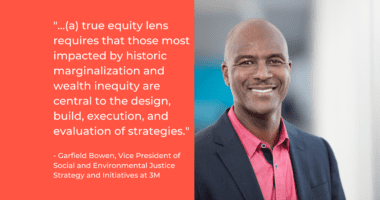How companies can take action to change the world—right now.
Just a few months ago, world leaders meeting at the UN in New York signed up to something extraordinary and unprecedented—17 ambitious goals ranging from ending extreme poverty to combatting climate change that apply equally to every country.
The ambition and universality of the new Global Goals for Sustainable Development mean that every country now has to work harder to achieve some, if not most, of the goals over the next 15 years. And because of our interconnected world, countries will have to work much more closely together to protect gains made from the triple threats of declining growth, emerging conflict and political instability that can engulf entire regions.
This new development environment where ambition, universality and cooperation reign, offers unprecedented opportunities for companies who pursue shared value strategies. There is a growing recognition that with most countries pursuing development through the expansion of markets, the private sector has become the major force for economic growth and job creation almost everywhere and strategies that harness business growth to drive development agendas are going to have the greatest impact.
Many companies, from CVS and Intel to GSK and Anglo American, are already assessing their business strategies against the global goals to see how they can establish new markets and reach new customers in a way that propels country achievement of the goals. Ultimately, it is the companies, and indeed the industries, that are able to build job-rich markets in ways that track one or more of the new goals that will leave the deepest footprint on the new world we now envisage.
But where to start?
For companies and industries just beginning to think about the global goals, here are 10 top picks for industry-specific agendas that could rapidly advance the achievement of the goals. If you work in a company that is an industry-leader in any of the sectors highlighted below, you are well placed to be part of the SDG transformation story over the next 15 years.
#1: The financial sector is well positioned to drive progress on three of the most critical goals—Goals 1 (poverty), 8 (jobs), and 10 (inequality)—simply by aggressively advocating for trade liberalization, by investing in pro-jobs companies and sectors, and by expanding access to health and social insurance. The financial sector has stood on the sidelines of development under the Millennium Development Goals and needs to take a seat at the head of the sustainable development table.
#2: The food, beverage, and agriculture sectors should take advantage of the untapped opportunities to advance Goals 2 (nutrition) and 12 (sustainable consumption) by producing nutritious, fortified foods and beverages and marketing them in ways that change the food behaviors of populations everywhere. As the recent Global Nutrition Report found, every country in the world is now struggling with some form of malnutrition and over time, the economic and social costs of undernutrition and obesity will threaten economic growth and human development. In many countries, they are already are.
#3. The extractives industry has the potential to transform population health (Goal 3) in many of the countries struggling with the highest burdens of early death and disability, by investing in health care infrastructure—including roads, water, and energy systems—alongside but not limited to, their areas of operation. Many of the populations with the highest child mortality rates are those with a wealth of natural resources, especially in sub-Saharan Africa, where the economic gains from resource wealth have not translated into population health improvements. The industry has a direct interest in investing in the health of children as the average life of a mine is 80 years—today’s children are tomorrow’s employees.
#4: The information technology sector could drive achievement of Goal 4 (education) by developing specialized products and delivery methods to eradicate illiteracy, especially among adult women. 700 million adults in the world are illiterate, 2/3 of them women, and literacy is the basic building block of a productive workforce and strong consumer base. With so many new tools to reach and teach people directly in their homes and places of work, this sector could completely disrupt dysfunctional education systems and open up access to populations previously denied.
#5: Pharmaceutical and consumer goods companies should embrace one of the highest impact, most under leveraged investments in global development—contraception—and deliver on Goal 5 (gender equity). By dramatically expanding access to modern contraceptives, fertility rates decline, child survival increases, women’s education, and labor force performance improves and the demographic dividend is often triggered. It is very important that companies work on both the demand and supply sides of the contraception challenge. It is not enough to produce a variety of quality, affordable contraceptive devices. Generations of women and girls need to be educated to understand their value and use.
#6: The infrastructure and utilities industry should focus on both Goals 6 (water and sanitation) and 9 (innovation) by finding new ways to provide clean water and sanitation where governments have failed. Lessons from history teach that basic public health infrastructure is the foundation for development, especially in societies experiencing rapid urbanization. With a tidal wave of urban growth around the corner in many parts of the world, especially in Africa and South Asia, companies investing in clean cities can make a major contribution to the global goals.
#7: The energy sector should target Goals 7 (energy) and 11 (cities) and invest now in meeting the energy needs of the underserved mega-cities of the future like Delhi, Mumbai, Dhaka, Karachi, Cairo, Lagos, Mexico City, and Kinshasa—each forecast to have populations above 20 million by 2030. Companies with new clean energy technologies that can leapfrog the mistakes of the past and the bad energy behavior of many developed country cities and forge new paths in low and middle-income countries will be among the stars of the new development era.
#8: The transport industry should lead on Goals 13, 14, and 15, all of which relate to climate change, by developing alternative forms of energy-efficient transportation. Transportation was neglected in the Millennium Development Goal era but with such an interconnected world and such high and growing demand for mobility both within and between countries, the time is ripe for new transportation solutions that do not threaten the planet.
#9: The telecommunications industry should start moving on Goal 16 (corruption and bribery) by expanding access to mobile phones as tools for exposing corruption and holding authorities accountable. This should not surprise those who have followed the extraordinary rise in the use of phone technology and social media platforms like Facebook and Twitter to expose human rights abuses and corruption and to support social movements that challenge brutal regimes. Of course, these tools can also be used by forces on the other side. The industry should weigh in to keep the balance in favor of democracy, freedom and human rights.
#10: And finally, all industries can make a positive impact on Goal 17 (partnership) by championing shared value as the highest impact engagement model for collective impact, and something all stakeholders need to pay close attention to. Shared value is not just a corporate agenda. It is a high-impact development strategy. There is still a long way to go to educate governments, the UN and the NGO community about shared value. Ideology and mistrust are still barriers to constructive dialogue and action. It is only through demonstrating impact that suspicion will be put to rest. We need bold leaders from all sectors to step forward to strike transformative partnerships and ruthlessly measure impact.
A final thought. Although all countries will benefit from shared value development strategies, some will benefit more than others. These are the populations most off track to reach the global goals—the people of central and west Africa, the people of northern India, Pakistan and Afghanistan, and the conflict-ridden middle east are in desperate need of progress. It is in these regions that shared value investments can contribute the most and the private sector should not shy away from charting an aggressive shared value agenda in these critical populations.




